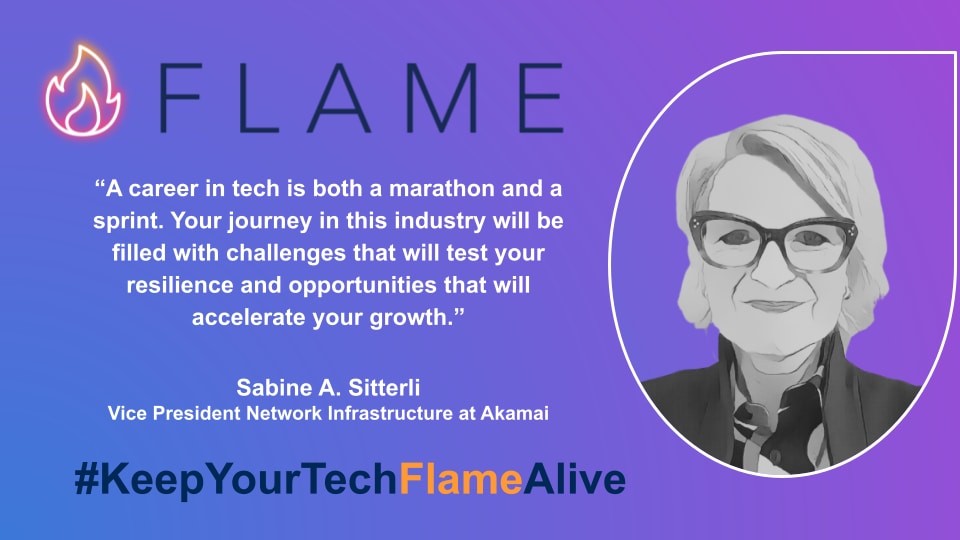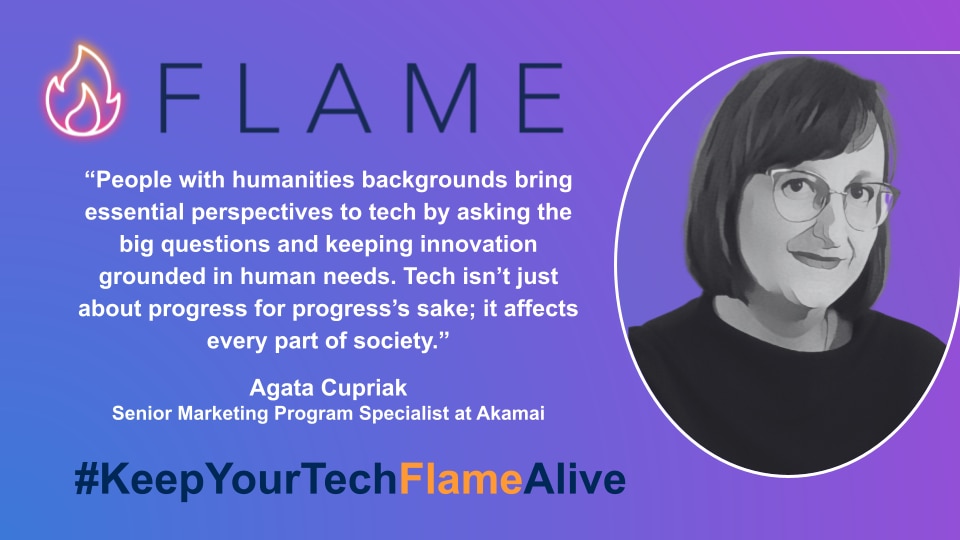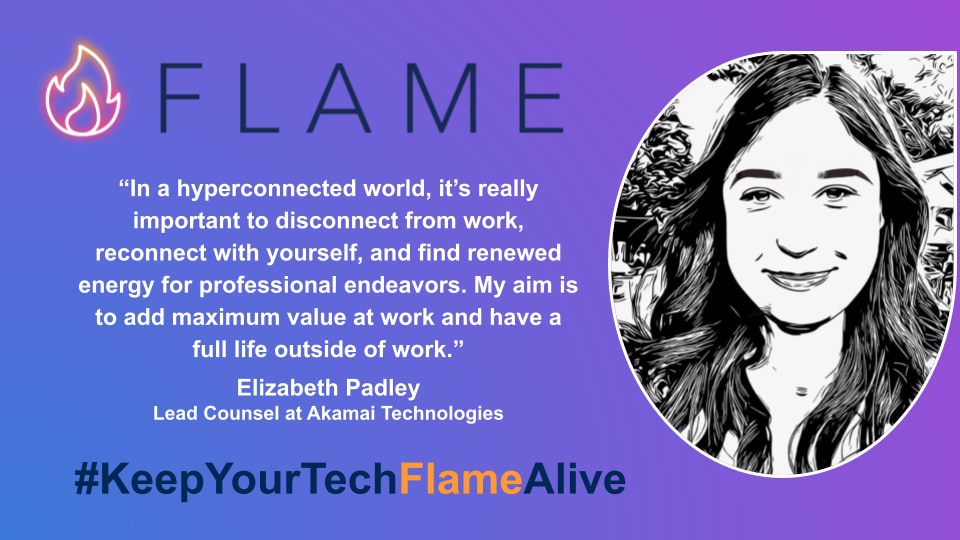Keep Your Tech Flame Alive: Akamai Trailblazer Sabine A. Sitterli

The Akamai Female Learning and Mentoring Experience (Akamai FLAME) was created to support and empower female tech talent to help shape the future of our industry. The FLAME Trailblazer blog post series shines a light on inspirational women in the tech industry. The women will give advice on how to keep your tech flame alive and share the most valuable lessons that they have learned during their trailblazing career journey.
This month’s story comes from Sabine A. Sitterli, Vice President of Network Infrastructure at Akamai. Sabine’s journey is a powerful example of perseverance, adaptability, and advocacy in the tech industry. Her dedication to fostering diversity and inclusion continues to pave the way for future generations of women in tech.
Sabine Sitterli, please tell us about your career journey in the IT industry
My journey in the IT industry started in high school, fueled by a curiosity for technology. My first part-time job involved converting handwritten scripts into digital files, which sparked a deeper interest in computer hardware and software. Together with my brother, I contributed to optimizing CNC engines for our family business, which sparked my passion for IT.
When it was time to choose a university program, I combined my love for business and mathematics by specializing in business informatics. During an internship, I joined the Networks team at formerly IBM Global Network Services — a role that I initially felt unprepared for. But with the encouragement and support of my colleagues, I quickly found my footing. Their belief in my ability to learn and adapt was key to my growth.
What has kept you motivated throughout your career?
What has kept me motivated all these years is the dynamic nature of the tech field and the opportunity to drive meaningful change. Throughout my career, I've had the privilege of working across various geographies and teams, and I’ve benefited from strong mentors and advocates. Those experiences shaped me and encouraged me to stay in the industry.
Moreover, the ability to mentor and advocate for diversity, especially for women in tech, has been incredibly fulfilling. Breaking norms and championing inclusivity are personal missions for me.
What are some of the challenges you’ve faced as a woman in the tech industry, and how have you overcome them?
Being a woman in tech, particularly in leadership roles, often means being the only woman in the room. This can be both challenging and empowering. There’s a certain pressure that comes with being underrepresented, and it often requires extra effort to have your voice heard or ideas recognized. However, I’ve been fortunate to have strong allies, particularly male colleagues, who have amplified my voice when it might have been overlooked.
One of the most valuable lessons I’ve learned is the importance of building relationships and finding allies — both men and women — who support you. Surrounding yourself with people who value your contributions and advocate for you makes a huge difference. I’ve also had mentors and advocates who have opened doors for me, which has been crucial to my success.
The challenges are real, but I’ve always found strength in continuous learning and adaptability. The tech industry is always evolving, and I’ve learned to embrace change and use it to fuel my growth. I’ve also become passionate about mentoring others, helping the next generation of women navigate similar challenges and advocating for a more inclusive environment.
What is your best piece of advice for women who are looking to develop their careers in the tech industry?
My advice to women aspiring to build a career in tech is that the journey is both a marathon and a sprint, and is filled with challenges that will test your resilience and opportunities that will accelerate your growth.
First and foremost, embrace continuous learning. The tech industry moves at a rapid pace, and staying relevant means being curious and proactive about expanding your knowledge. Whether it’s mastering new technologies or developing leadership skills, make learning a lifelong habit.
Second, never underestimate the power of a strong network. Seek out mentors who can guide you, allies who will support you, and sponsors who can open doors you didn’t know existed. This network is vital, especially in an industry in which women are often underrepresented. These relationships will help amplify your voice and provide support throughout your career.
Confidence is also key. Tech can be intimidating, especially when you’re one of the few women in the room, but your perspective is valuable. Don’t be afraid to assert your ideas and take on leadership roles. The industry needs more diverse voices, and your contributions matter.
Finally, pay it forward. As you rise, mentor others and open doors for them. Advocating for diversity and inclusion isn’t just about advancing your own career — it’s about ensuring that others have the same opportunities.
How do you see the future of women in tech?
I’m incredibly optimistic about the future of women in tech. We’ve seen progress in recent years, which is just the beginning, and the momentum is building for even greater inclusion and opportunity. Women are increasingly shaping the landscape of innovation, bringing unique perspectives that drive creativity, problem-solving, and business growth.
As more women break down barriers, they’re not only participating but also leading and redefining what success looks like in this industry. The shift we’re seeing is much more than a trend; it’s a fundamental transformation. Companies are recognizing that diverse teams lead to better outcomes, fostering environments in which different voices are celebrated and given the space to thrive.
However, true inclusivity goes beyond just representation. It means cultivating cultures of belonging in which everyone, regardless of gender, race, or background, feels empowered to contribute. When diverse voices are valued, it sparks a cycle of innovation and success that benefits the entire industry. The future is bright, and I believe women in tech will continue to be at the forefront of driving this change, setting new standards for leadership and creativity.
What changes do you think are needed to ensure a more inclusive industry?
To ensure a more inclusive industry, we need to focus on representation at all levels, particularly in leadership roles. Women need to see role models in leadership positions to know that they, too, can achieve the same.
Therefore, at Akamai, we have the Executive Women’s Network, which I'm excited to co-lead alongside two other incredible women. Together, we aim to support, uplift, and empower women at Akamai by fostering strong professional relationships, sharing knowledge, increasing visibility, and driving meaningful business impact through advocacy, mentoring, and leadership development.
Beyond that, companies should invest in mentorship programs, allyship, and initiatives that break down barriers for underrepresented groups.
It’s also important to address unconscious biases that can impact hiring, promotions, and everyday interactions. Companies should provide training to help employees recognize and counter these biases.
And, finally, we need to continue pushing for policies that support work-life balance, parental leave, flexible working arrangements and other health benefits (for example, support during menopause, which is not often being talked about) to create a more equitable environment for all.
By staying committed to these goals, I believe we can create a more inclusive, diverse and dynamic tech landscape in which everyone has the opportunity to thrive.
Do you think initiatives like FLAME play a role in making the tech industry’s future a better place?
Absolutely. Initiatives like FLAME are important in creating a more inclusive and equitable tech industry. They provide visibility to underrepresented groups and create communities in which people can share their experiences, learn from one another, and find support. It’s crucial to foster environments in which mentorship, networking, and personal growth are prioritized, which are all critical to helping individuals advance in their careers.
More important, initiatives like FLAME challenge the status quo. They push companies to rethink how they approach diversity and inclusion, and they encourage organizations to create cultures in which diverse voices are not only heard but also truly valued.
By empowering individuals to take charge of their careers and encouraging companies to build more inclusive workplaces, we can all help shape a future in which the tech industry is better, more diverse, and more innovative.
Learn more
Stay tuned for more inspiring stories in our Trailblazer series. To keep an eye out for further exciting content and events in 2024, please join our LinkedIn page!



